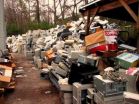(Press-News.org) Almost three quarters of disposed electrical household appliances in Spain are processed out of the Integrated Waste Management System (SIG). A study at the University of Salamanca exposes how many manufacturers are not registered in the established waste management system and avoid payment.
According to the European directive on waste electrical and electronic equipment, manufacturers of such products should recycle the waste they generate during their activity until reaching an annual level of 4 kg per inhabitant. However, in Spain the majority of unused equipment is managed under unauthorised systems. This is the case according to the revelations of the study by researchers at the University of Salamanca, which was published in the 'Journal of cleaner production'.
"It is estimated that only 1000 out of 10 000 manufacturers are registered in Spain. This implies a payment evasion of at least 15 million euros," as explained to SINC by Dolores Queiruga, current researcher in the Business and Economics Department of the University of La Rioja.
In 2010, Spaniards generated 652 million kilograms of this waste or, in other words, 13.86 kg per person. Out of this amount, just 2.55 kg were collected and processed correctly under the "integrated management systems" (SIG). SIG consists of a collective model that manufacturers can use to manage their waste as well as waste management on an individual level.
In Spain there are currently seven SIGs, which are a collection of foundations that bring together companies from the electronics sector: ECOLEC, ECOTIC, ECOLUM, AMBILAMP, ECO-RAEEs, ECOASIMELEC and ECOFIMATICA.
The study analyses the evolution and stages of development for the treatment of this type of waste, starting from the first drafts of the European directive regulating electronic waste management to the current situation.
As for large electrical appliances for example, it is estimated that more than 70% of fridges and freezers are collected and treated in an uncontrolled way, with manufactures taking advantage of the fact that they are not breaking the law. The same goes for television and screens.
As Queiruga states, "the problem is that many manufacturers are not included in the official register of the Ministry of Industry that manages electronic waste (WIE-WEEE), thus making control difficult."
The study reveals that Spain's waste management system has some weak points. It suggests that registered manufacturers fulfilling the legal framework are economically worse off compared to those that do not assume the recycling costs themselves. The authors have also reported a delay on the part of the Autonomous Governments in developing public policy.
The need for leadership
When the European Union drew up the first draft of the directive, Spain was able to bring together interested agents in order to close collective deals on WEEE recycling. However, there were differences between the autonomous communities when it came to going ahead with pilot projects. The forerunners were Catalonia and the Basque Country.
The study outlines the importance of "a pioneering agent to set a model to be followed by others," like the company 'Indumental Recycling'. "Its background, experience and support in pilot projects represented a great impulse in the development of waste management systems," adds the study.
"With the first drafts of the European Directive, manufacturers realised they had to take responsibility for the waste generated by their products and all those involved began to think about the best way to go about waste management," as explained to SINC by Queiruga.
According to Queiruga, "recycling quotas also reduce the amount of appliances that are thrown away. Regarding the possibilities for reducing the number of appliances disposed of each year, the expert feels it is important to extend the useful life of the product through repair and citizen awareness. The expert also points out the importance of reuse so that they take longer to turn into waste.
Despite all this, the research study suggests that the waste management system in Spain could serve as an example for other countries that are just starting. It concludes that Spain could become a referent for other countries like the United Kingdom, the Unites States and China, where the majority of WEEEs are returned to the manufacturer or managed under volunteer programmes or other informal channels.
INFORMATION:
References:
Queiruga, D.; González Benito, J.; Lannelongue, G. "Evolution of the electronic waste management system in Spain". Journal of cleaner production 24: 56-65, 26 de noviembre de 2011. DOI: 10.1016/j.jclepro.2011.11.043
More than 70% of electronic waste management is uncontrolled
2012-09-04
ELSE PRESS RELEASES FROM THIS DATE:
Major world interests at stake in Canada's vast Mackenzie River Basin
2012-09-04
The governance of Canada's massive Mackenzie River Basin holds enormous national but also global importance due to the watershed's impact on the Arctic Ocean, international migratory birds and climate stability, say experts convening a special forum on the topic.
"Relevant parties in western Canada have recognized the need for a multi-party transboundary agreement that will govern land and water management in the Mackenzie River watershed. Successful collaboration will effectively determine the management regime for a watershed covering 1.8 million square kilometers or ...
Annals of Internal Medicine tip sheet for Sept. 4, 2012
2012-09-04
1. No Nutritional or Safety Differences Between Organic and Conventional Foods
There is generally no difference in nutritional value or risk for bacterial contamination between organic and conventional foods, according to a new study being published in Annals of Internal Medicine, the flagship journal of the American College of Physicians (ACP). While the consumption of organic fruits and vegetables reduced exposure to any detectable pesticide residues by 30 percent, pesticide levels were generally within the allowable limits for safety.
Researchers conducted a systematic ...
Even in normal range, high blood sugar linked to brain shrinkage
2012-09-04
MINNEAPOLIS – People whose blood sugar is on the high end of the normal range may be at greater risk of brain shrinkage that occurs with aging and diseases such as dementia, according to new research published in the September 4, 2012, print issue of Neurology®, the medical journal of the American Academy of Neurology.
"Numerous studies have shown a link between type 2 diabetes and brain shrinkage and dementia, but we haven't known much about whether people with blood sugar on the high end of normal experience these same effects," said study author Nicolas Cherbuin, ...
Little evidence of health benefits from organic foods, Stanford study finds
2012-09-04
STANFORD, Calif. — You're in the supermarket eyeing a basket of sweet, juicy plums. You reach for the conventionally grown stone fruit, then decide to spring the extra $1/pound for its organic cousin. You figure you've just made the healthier decision by choosing the organic product — but new findings from Stanford University cast some doubt on your thinking.
"There isn't much difference between organic and conventional foods, if you're an adult and making a decision based solely on your health," said Dena Bravata, MD, MS, the senior author of a paper comparing the nutrition ...
Tigers take the night shift to coexist with people
2012-09-04
Tigers don't have a reputation for being accommodating, but a new study indicates that the feared and revered carnivores in and around a world-renowned park in Nepal are taking the night shift to better coexist with their human neighbors.
The revelation that tigers and people are sharing exactly the same space – such as the same roads and trails – of Chitwan National Park flies in the face of long-held convictions in conservation circles. It also underscores how successful conservation efforts need sciences that takes into account both nature and humans.
"As our planet ...
Reciprocity an important component of prosocial behavior
2012-09-04
While exchanging favors with others, humans tend to think in terms of tit-for-tat, an assumption easily extended to other animals. As a result, reciprocity is often viewed as a cognitive feat requiring memory, perhaps even calculation. But what if the process is simpler, not only in other animals but in humans as well?
Researchers at the Yerkes National Primate Research Center, Emory University, have determined monkeys may gain the advantages of reciprocal exchange of favors without necessarily keeping precise track of past favors. Malini Suchak, a graduate student at ...
Mathematics or memory? Stanford study charts collision course in brain
2012-09-04
STANFORD, Calif. — You already know it's hard to balance your checkbook while simultaneously reflecting on your past. Now, investigators at the Stanford University School of Medicine — having done the equivalent of wire-tapping a hard-to-reach region of the brain — can tell us how this impasse arises.
The researchers showed that groups of nerve cells in a structure called the posterior medial cortex, or PMC, are strongly activated during a recall task such as trying to remember whether you had coffee yesterday, but just as strongly suppressed when you're engaged in solving ...
Mass spec makes the clinical grade
2012-09-04
RICHLAND, Wash. -- Combining two well-established analytic techniques and adding a twist identifies proteins from blood with as much accuracy and sensitivity as the antibody-based tests used clinically, researchers report this week in Proceedings of the National Academy of Sciences Early Edition online. The technique should be able to speed up development of diagnostic tests and treatments based on proteins specific to certain diseases.
The team of scientists at the Department of Energy's Pacific Northwest National Laboratory found that their technique, called PRISM, ...
High doses of Vitamin D help tuberculosis patients recover more quickly
2012-09-04
For decades before antibiotics became generally available, sunshine was used to treat tuberculosis, with patients often being sent to Swiss clinics to soak up the sun's healing rays. Now, for the first time scientists have shown how and why heliotherapy might, indeed, have made a difference.
A study led by researchers at Queen Mary, University of London, conducted in collaboration with the Medical Research Council's National Institute for Medical Research, has shown that high doses of vitamin D, given in addition to antibiotic treatment, appear to help patients with tuberculosis ...
Prenatal maternal smoking associated with increased risk of adolescent obesity
2012-09-04
CHICAGO – Prenatal exposure to maternal cigarette smoking appears associated with an increased risk for adolescent obesity, and is possibly related to subtle structural variations in the brain that create a preference for eating fatty foods, according to a report published Online First by Archives of General Psychiatry, a JAMA Network publication.
"Prenatal exposure to maternal cigarette smoking is a well-established risk factor for obesity, but the underlying mechanisms are not known," the authors write as background information. "Preference for fatty foods, regulated ...


